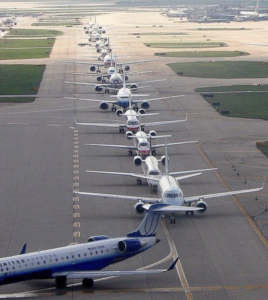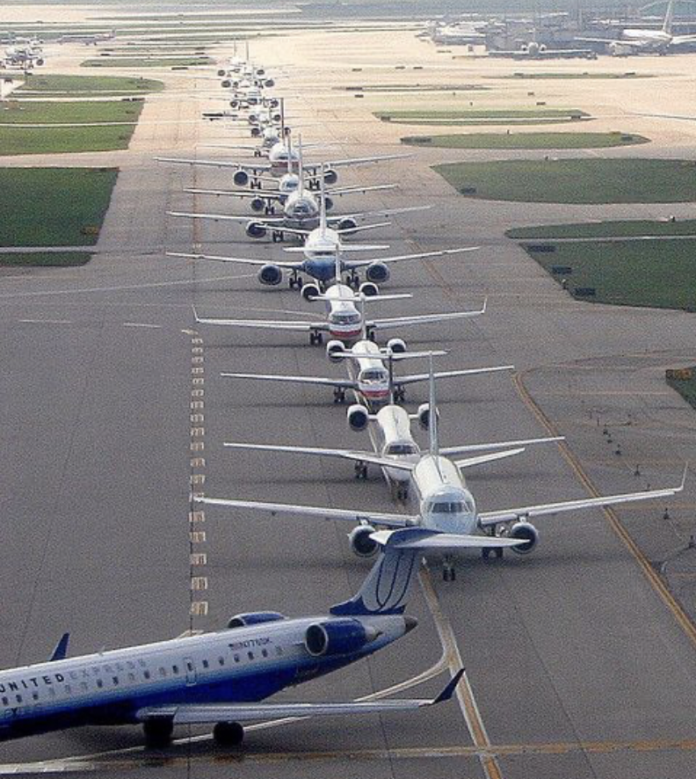
I wasn’t expecting to land in Seattle. Really, I wasn’t. I was a Chicago Boy.
But I’d gotten into this odd profession.
Defending the interests of what one Chicago Democrat in the state legislature called “hysterical housewives.”
That would be communities not willing to brook unfettered growth of major airports. Yes, there were jobs. And what economists called “negative externalities.” Bone-rattling noise and particulate emissions.
I always said it was a balancing act. To skeptical business group at a local Kiwanis luncheon one fine afternoon in greater Chicagoland I explained my theory.
It’s Like Peanut Butter, See…
The FDA allows a certain concentration of finely ground insect parts in peanut butter. But what if they industry wanted the limit eased upward by, say, forty percent? Right. Exactly. Who would just roll over obediently for that?
Half the room nodded, with wry smiles. The other half gave me the stink eye.
We also we had a great pro-growth shtick – something quite genuine. We advocated a new airport. I get to that hairy saga – and the present day resurfacing of the issue, which you may have missed as the body count grows hourly in Chicago – in my new book, “What Next, Chicago? Notes of a Pissed-off Native Son.”
But let’s get in the time machine for a minute, with Sherman and Mister Peabody.
When we landed, there were Boris and Natasha.
I will explain.
In 1994, Seattle was neck deep in airport politics just like Chicago had been. There was a new airport study unfolding.
And an outside arbitration panel would decide whether to allow a new runway at Sea-Tac Airport. The arbitrators had been given binding powers, so politics wouldn’t taint that decision. I thought this was tremendously progressive and upstanding. Something like this would never happen in Chicago.
I hadn’t been thinking I would ever end up in Seattle although I had visited in 1976 with my dad. After a trip through the Canadian Rockies and a stay in Vancouver, we headed south to eventually fly back home from Seattle. A fifty-something guy from Chicago with an eighteen-year-old who looked like a rock band roadie. Or worse. The border cops were convinced we were drug dealers.
Ricardo’s Lament
They pried off the metallic “Cordoba” lettering off our rented Chrysler. Something might be underneath.
They cut open the Corinthian leather.
Somewhere Ricardo Montalban wept.
They passed word to local cops who followed us and busted into our Bellingham motel cubicle using the pretext of planted explosives.
The call had come from the lobby. “There’s a bomb threat to the Royal Coach Suite! The Police are coming up!”
Right. A crummy little forty-dollar squat by the Interstate, with two queen beds, a dim lamp, and a busted clock radio.
Just the target for Bill Ayers and the Weather Underground.
The fuzz piled in. Tossed the drawers and mattresses. Muttered. Straightened things up, sort of.
Ground their teeth on the way out.
Years later I would see Chicago guys were still suspect in the Northwest.
In Chicago my assignment had grown to include building a national coalition of city governments and grassroots groups fighting increased jet noise around older urban airports. We managed to get a bill through Congress and signed into law. One of those half-a-loaf deals. Older jets like 727s would be phased out, but new local noise rules would be federally pre-empted. All that “undue burden on interstate commerce” stuff. You know the drill.
Early in ’94 I got a call from some suburban Seattle airport activists. I had advised them to get local government funding. Now they had. They were looking to hire someone like me. I was flown out for a few days of meetings to talk about a new job.
The Needle And The Damage Done
Nirvana’s Kurt Cobain had just taken his own life. His wife Courtney Love told a gathered throng in the Space Needle’s shadow he was “an asshole.” U.S Olympic figure skating hopeful Tonya Harding of suburban Portland had just had top rival Nancy Kerrigan knee-capped. She didn’t need a Teamster, which was the M.O. in Chicago. Her ex-husband and bodyguard hired the attacker.
A guy nobody knew named Jeff Bezos had just moved to Seattle from New York. In his suburban Bellevue garage on desks made from doors he was coding a site for an online bookstore that would go live in 1995.
Before I got my Seattle job offer, one night around 3 a.m. back in Chicago I got a strange pre-recorded phone call. I let my machine screen it.
A macho voice said he was a gang boss calling from the federal lock-up in downstate Illinois. He wanted me to invest in a big weed buy. Very lucrative on the back end. He gave me a phone number I should call if interested. I didn’t pick up but listened in horrified fascination. I figure it’s Human Resources at my maybe-new job. Never can be too careful with these Chicago guys.
I passed the test if that’s what it was. On the first day of May, 1994, my wife and I flew one-way from Chicago to Seattle on Mark Air. Ripley our tabby cat in a carrying case. He’d been exfiltrated by college pals from a dive bar on Howard Street called The P.M. Club. That one with the fake-mean bartender named Sonny whose abuse was lapped up like warm milk by NU students imagining they were slumming a little.
I began work not long afterward. The Port of Seattle was hosting something called Sea-Tac University to “educate” communities about the airport’s expansion needs. So. My turn comes at the microphone. Suddenly there’s a problem with the community access cable live feed.
A Mysterious ‘Typo’
I continue anyway and reveal an FAA document showing plans for two new runways at Sea-Tac, not just the advertised one. A ruckus ensues and authorities say it’s “a typo.” This doesn’t go over well.
The issue quickly reaches mainstream media. In my aggressive Chicago manner I continue to press the Port publicly on being disingenuous. A columnist for the prominent local weekly – the guy also runs a public relations firm – writes that I should cool my jets. That uncouth Chicago stuff won’t work here.
Our side discovers via public records that he is on the Port’s payroll as a communications consultant. This gets revealed in a published letter to the editor. He is relieved of his column.
As if on cue the lead airport expansion consultant from Chicago, with a wired firm called Landrum and Brown, begins showing up at all the Seattle public meetings on airport planning.
Chicago’s lead outside attorney on airport affairs arrives in Seattle as a new regular too. A little guy about the size of Robert Reich. Or Milton Friedman. The brainpower of the real giants can be in inverse proportion to their physical stature. This guy was no exception. A fine gentleman, as well.
We all share a smile across the meeting room. The gang’s all here. Feels like home.
Even more so after a big change of heart by the regional planning council. That was the body that commissioned the new airport study and hired the arbitrators to make a binding decision on Sea-Tac expansion.
The new airport study gets cancelled before it’s even done.
And after the arbitrators make the wrong choice – to deny a new Sea-Tac runway – the regional council overrides them and authorizes it.
The fix was in.
Chicago-style.
Small world; what can I say?
